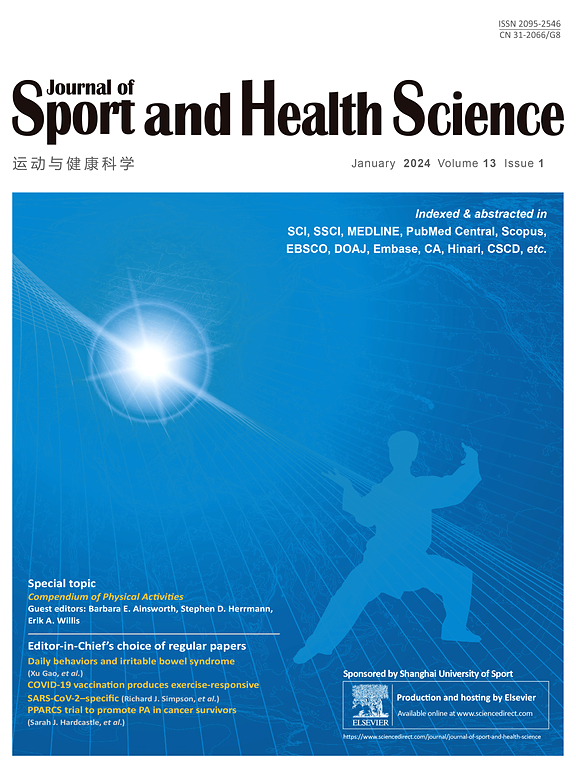The exercise-conditioned human serum and skeletal muscle cells secretome induce apoptosis in breast cancer cells.
IF 10.3
1区 医学
Q1 HOSPITALITY, LEISURE, SPORT & TOURISM
引用次数: 0
Abstract
BACKGROUND Regular exercise training provides significant health benefits among cancer survivors and is associated with lower breast cancer mortality and reduced risk of recurrence. Both exercise-induced factors secreted into circulation (exerkines) and bioactive molecules contained in skeletal muscle secretome have been proposed to affect the tumor microenvironment and mediate some of the anti-carcinogenic effects of exercise. This study utilized exercise-conditioned human serum obtained from breast cancer patients during chemotherapy and skeletal myotubes' secretome after mechanical loading to investigate their effects on breast cancer cells in vitro. METHODS Breast cancer patients participated in a 12-week exercise training program during their chemotherapy, and blood serum was collected immediately before and after an exercise session in the 2nd and 12th weeks of training. Skeletal myoblasts were differentiated into myotubes and subjected to mechanical stretching to collect their secretome (stretch medium (SM)). Hormone-sensitive Michigan Cancer Foundation-7 (MCF-7) and triple-negative M.D. Anderson-Metastatic Breast-231 (MDA-MB-231) breast cancer cells were treated with either human serum or with the skeletal myotubes' secretome to examine their metabolic activity, migration, cytotoxicity levels and apoptosis regulation. RESULTS The exercise-conditioned serum obtained from breast cancer patients who were subjected to the 12-week training during chemotherapy resulted in reduced metabolic activity (p < 0.001) and increased lactate dehydrogenase (LDH) activity (cytotoxicity) (p < 0.001) in both MCF-7 and MDA-MB-231 breast cancer cells when compared with the control condition. Moreover, incubation of breast cancer cells with the post-exercise serum induced apoptosis in MCF-7 and MDA-MB-231 cells, as indicated by increase in DNA damage and the percentage of necrotic cells (p < 0.05) when compared to pre-exercise condition. Similarly, a significant decrease (p < 0.001) was observed in the metabolic activity of MCF-7 cells treated with the SM, along with increased cytotoxicity (p < 0.05), compared to the cells cultured with the regular growth media. Comparable though not as profound effects were observed in MDA-MB-231 cells when treated with the SM secretome. Furthermore, the expression of apoptosis-inducing caspase-7 (p < 0.001) and caspase-8 (p < 0.01) proteins was increased, whereas cell survival-regulating factors interleukin-8 (IL-8) (p < 0.001), superoxide dismutase-2 (SOD-2) (p < 0.05), Fas cell surface death receptor (Fas) (p < 0.05), and vascular endothelial growth factor (VEGF) (p < 0.01) were downregulated in the SM-treated MCF-7 cells. In addition, the migrating behavior of MCF-7 cells was diminished, and higher levels of DNA damage were observed in cells treated with either SM or non-stretch media (NSM). CONCLUSION Both exercise-conditioned serum of breast cancer patients and skeletal myotubes secretome after mechanical loading can reduce the metabolic activity, promote cell toxicity and DNA damage, modulate the protein expression of crucial cell survival-regulating factors, and lead to apoptosis in breast cancer cells. These findings suggest that even after cancer diagnosis, exercise may exert beneficial effects additive to chemotherapy against breast cancer prognosis.运动条件下的人血清和骨骼肌细胞分泌组诱导乳腺癌细胞凋亡。
背景:定期的运动训练为癌症幸存者提供了显著的健康益处,并与降低乳腺癌死亡率和降低复发风险相关。运动诱导因子(运动因子)和骨骼肌分泌组中所含的生物活性分子均可影响肿瘤微环境,并介导运动的部分抗癌作用。本研究利用从乳腺癌患者化疗期间获得的运动条件下的人血清和机械负荷后的骨骼肌管分泌组,在体外研究它们对乳腺癌细胞的影响。方法乳腺癌患者在化疗期间进行为期12周的运动训练,在第2周和第12周的训练前后立即采集血清。将骨骼肌母细胞分化为肌管,机械拉伸收集其分泌组(拉伸培养基(SM))。激素敏感的密歇根癌症基金会-7 (MCF-7)和三阴性的M.D.安德森转移性乳腺-231 (MDA-MB-231)乳腺癌细胞用人血清或骨骼肌管分泌组处理,以检查其代谢活性、迁移、细胞毒性水平和凋亡调节。结果与对照组相比,在化疗期间进行12周训练的乳腺癌患者运动条件血清中MCF-7和MDA-MB-231乳腺癌细胞的代谢活性降低(p < 0.001),乳酸脱氢酶(LDH)活性(细胞毒性)升高(p < 0.001)。此外,与运动前相比,运动后血清培养乳腺癌细胞诱导MCF-7和MDA-MB-231细胞凋亡,DNA损伤和坏死细胞百分比增加(p < 0.05)。同样,与用常规培养基培养的细胞相比,用SM处理的MCF-7细胞的代谢活性显著降低(p < 0.001),细胞毒性增加(p < 0.05)。SM分泌组在MDA-MB-231细胞中观察到类似但不那么深刻的影响。凋亡诱导蛋白caspase-7 (p < 0.001)和caspase-8 (p < 0.01)表达增加,细胞存活调节因子IL-8 (p < 0.001)、超氧化物歧化酶-2 (SOD-2) (p < 0.05)、Fas细胞表面死亡受体(p < 0.05)和血管内皮生长因子(VEGF) (p < 0.01)表达下调。此外,MCF-7细胞的迁移行为减弱,在SM或非拉伸介质(NSM)处理的细胞中观察到更高水平的DNA损伤。结论运动条件下的乳腺癌患者血清和机械负荷后的骨骼肌管分泌组均可降低乳腺癌细胞的代谢活性,促进细胞毒性和DNA损伤,调节关键细胞存活调节因子的蛋白表达,导致细胞凋亡。这些发现表明,即使在癌症诊断后,运动也可能对乳腺癌预后产生有益的影响。
本文章由计算机程序翻译,如有差异,请以英文原文为准。
求助全文
约1分钟内获得全文
求助全文
来源期刊

Journal of Sport and Health Science
SPORT SCIENCES-
CiteScore
18.30
自引率
1.70%
发文量
101
审稿时长
22 weeks
期刊介绍:
The Journal of Sport and Health Science (JSHS) is an international, multidisciplinary journal that aims to advance the fields of sport, exercise, physical activity, and health sciences. Published by Elsevier B.V. on behalf of Shanghai University of Sport, JSHS is dedicated to promoting original and impactful research, as well as topical reviews, editorials, opinions, and commentary papers.
With a focus on physical and mental health, injury and disease prevention, traditional Chinese exercise, and human performance, JSHS offers a platform for scholars and researchers to share their findings and contribute to the advancement of these fields. Our journal is peer-reviewed, ensuring that all published works meet the highest academic standards.
Supported by a carefully selected international editorial board, JSHS upholds impeccable integrity and provides an efficient publication platform. We invite submissions from scholars and researchers worldwide, and we are committed to disseminating insightful and influential research in the field of sport and health science.
 求助内容:
求助内容: 应助结果提醒方式:
应助结果提醒方式:


